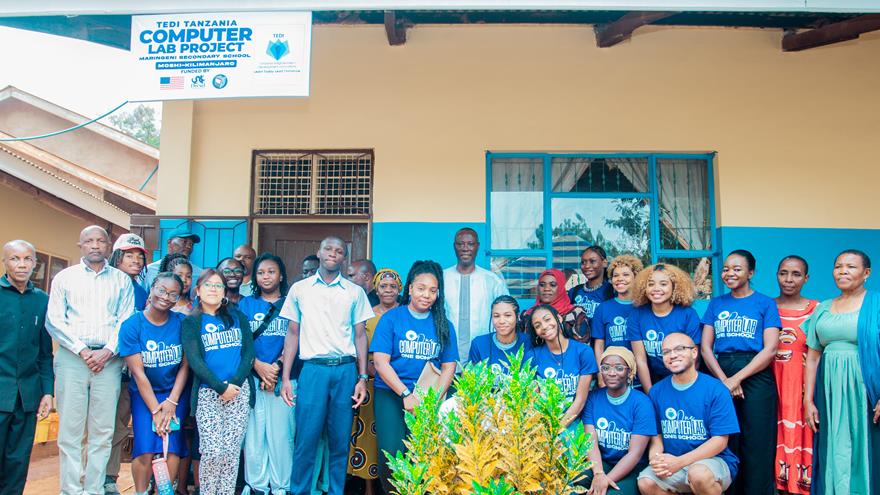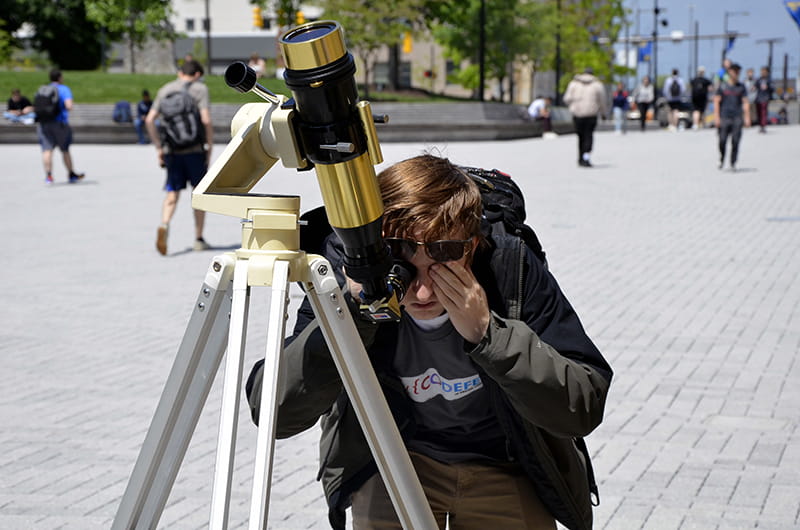Intro to Astronomy Class Provides Innovative, Interpersonal Ways to Discover the Cosmos

- Through Connections and Community, Drexel Course Helps Launch Computer Lab in Tanzania
- Drexel's Self-Heating Concrete Is One Step Closer to Clearing Sidewalks Without Shoveling or Salting
- Pinging Pipes Could Help to Identify Lead Water Lines Without Excavation
- 40 Years Ago, Drexel Made Computer — and Apple — History

This piece is part of the DrexelNow series showcasing "A Day in the Class" for some of Drexel University's most interesting and impactful courses.
Students in “PHYS 131 — Survey of the Universe” are currently studying moon phases. Professor Gordon Richards, PhD, of Drexel University’s Department of Physics in the College of Arts and Sciences, passes out an activity sheet on predicting phases and students shift into groups of four to complete it.
Some groups study the handout attentively, working through each question with vigor. Other groups go about it a bit less intently, allowing conversation to devolve or sneaking bites of their lunch (the 80-minute class starts at 12:30 p.m. twice a week).
Like the attention of the class or the waxing and waning of the moon, the Drexel student interest in this introductory astronomy class has also fluctuated in recent years. A vast majority of the students who enroll come from outside of the Physics Department and the astrophysics minor to take the class as an elective. This is also true of the online version of the class that’s offered. Richards said he used to see a lot of non-STEM students in teacher education and business taking the course, but now he sees more with backgrounds in computer science.
Like the attention of the class or the waxing and waning of the moon, the Drexel student interest in this introductory astronomy class has also fluctuated in recent years. A vast majority of the students who enroll come from outside of the Physics Department and the astrophysics minor to take the class as an elective. This is also true of the online version of the class that’s offered. Richards said he used to see a lot of non-STEM students in teacher education and business taking the course, but now he sees more with backgrounds in computer science.
“So I’m surprised [the class] doesn’t have a bigger enrollment in that sense,” he continued. “I don’t think it’s a hard class. Students that actually show up and do the reading and the homework and come to lecture generally don’t have too much trouble with it.”
Richards would like to see enrollment in this introductory class more like it is in the comparable class offered at Penn State University, where he did a postdoctoral research fellowship. Richards still keeps in touch with faculty there, and they recently introduced him to an interesting teaching method they employed in their introductory courses that helped increase enrollment even more.
Dragons, are you ready to conquer the Astroventure?
That’s right, this fall Richards is hoping to pilot a video game class created at Penn State. He hopes that the visual nature of the subject will translate to greater apprehension and engagement through the game. The video game also allows for students to take the class at largely their own pace during the term, whereas the current online class offering is still taught in modules that must be completed incrementally.
That’s right, this fall Richards is hoping to pilot a video game class created at Penn State. He hopes that the visual nature of the subject will translate to greater apprehension and engagement through the game. The video game also allows for students to take the class at largely their own pace during the term, whereas the current online class offering is still taught in modules that must be completed incrementally.
“It’s just a different type of online presentation, so we’ll see,” Richards said of piloting the class. “I’m afraid it might scare away some people because there is some math and sort of a technical aspect to it, but it is done in a way to be accessible to non-STEM students.”
In his current, in-person format for the class, Richards tries not to bog down the diverse mix of students with too many numbers or complex problems that they are likely to forget at the end of the term. Instead, he focuses on finding ways for the students to connect with astronomy and learn how the stars and galaxies have affected our history and continue to affect our modern-day lives.
“Nothing changes in classical astronomy, whereas I try to focus more on, ‘Why do you need me to teach this class? Why can’t an adjunct teach the class and just sort of read the book?’ Because I know what is new in the field today,” Richards said. “For example, I was at some NASA meeting last week and I know that this press release is coming out and it’s exciting, it’s a big deal. … So that’s kind of how I see my class: ‘What’s the new stuff that’s going on?’”
“Nothing changes in classical astronomy, whereas I try to focus more on, ‘Why do you need me to teach this class? Why can’t an adjunct teach the class and just sort of read the book?’ Because I know what is new in the field today,” Richards said. “For example, I was at some NASA meeting last week and I know that this press release is coming out and it’s exciting, it’s a big deal. … So that’s kind of how I see my class: ‘What’s the new stuff that’s going on?’”
It’s these personal insights that some current students might miss with a fully online version of PHYS 131.
“Having it online is an OK concept, but I really like learning it in class because I’m very interested in the subject,” said Eric Skoglund, BS electrical engineering ’19 who took the class during his last semester at Drexel. “Having [Richards] talk about it and speak about it and having him adlib when he’s presenting makes it more engaging and interesting. So I would rather have it be in class, but a video game idea is an interesting concept.”
On the other hand, Peyton Smiley, a second-year computer security technology student, said an online video game format would lend itself to the visual nature of the subject. At the same time, Smiley said online students would also miss out on other memorable components on Richards’ in-person class, like visiting the Joseph R. Lynch Observatory and the observatory at The Franklin Institute.
On the other hand, Peyton Smiley, a second-year computer security technology student, said an online video game format would lend itself to the visual nature of the subject. At the same time, Smiley said online students would also miss out on other memorable components on Richards’ in-person class, like visiting the Joseph R. Lynch Observatory and the observatory at The Franklin Institute.
Video game or not, increased enrollment or not, it’s piquing this interest in the subject that is Richards’ ultimate goal for the class — one he has already accomplished.
“I’m not expecting anybody to remember any of this 20 or 30 years from now,” he said. “What I’m hoping is that they’re like, ‘Oh yeah, I remember astronomy class? It was pretty interesting.’”
Students interested in either the online or face-to-face classes this fall can see the syllabi here.In This Article
Drexel News is produced by
University Marketing and Communications.
